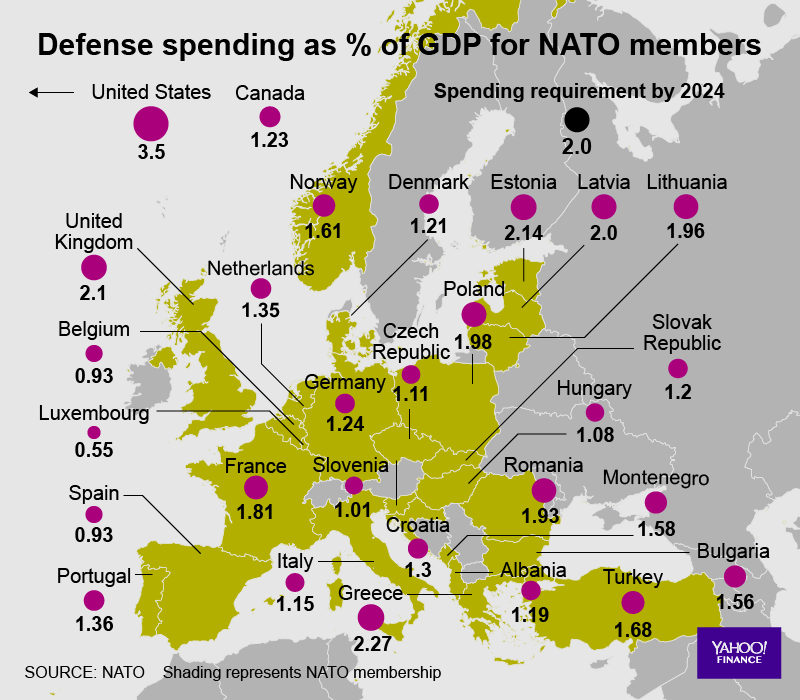Trump is right about the NATO deadbeats
President Trump has consistently railed against other members of the NATO security alliance for freeloading off the United States and not doing enough to manage their own defense.
“NATO has not treated us fairly,” he told reporters before leaving for a NATO summit meeting this week in Brussels. “We pay far too much and they pay far too little.”
As with many Trump crusades, there’s truth to his claims—but more to the story. Trump will press for more European defense spending at this week’s meeting, which is likely to be contentious. Other NATO members are already pushing back, arguing that their commitment to defense is rising and they back US priorities in other important ways. But the basic numbers support Trump.
The United States has been the biggest contributor to NATO since Western nations founded the alliance in 1949 to help prevent any more world wars and shield Europe from the Soviet Union. Underpayments by European nations have been contentious since long before Trump started complaining about the problem–especially following the fall of the Berlin Wall in 1989, when many nations began to slash defense spending.
In 2014, NATO agreed that each member country should spend a minimum of 2% of GDP on defense within a decade. So far, only five countries meet that threshold: the United States, the United Kingdom, Greece, Estonia and Latvia. The United States spends 3.5% of GDP on defense, the most of any NATO member. Among other big NATO members, France spends 1.8% of GDP on defense, Germany 1.2%, Italy 1.2%, and Spain 0.9%.
NATO has 29 member countries. Here’s how they measure up:

NATO said earlier this year that eight members will meet the 2% threshold in 2018, with Poland, Romania, and Lithuania joining the club. The alliance also said 15 nations would hit the target by 2024, though it hasn’t identified the other seven. That would still leave 14 members falling short of NATO’s own spending target. And that’s if there’s no recession by then, which could force governments to cut spending, not raise it, as tax revenue declines.
European leaders seem to realize they have a weak argument when Trump blasts them for subpar defense spending. Donald Tusk, president of the European Council, argued in a statement prior to Trump’s visit that Europe spends more on defense than China and Russia, and he urged Trump to “appreciate your allies.” But he also acknowledged that Trump is right on spending, saying “dear Europe, spend more on your defence, because everyone respects an ally that is well-prepared and equipped.”
While Trump is right about the spending numbers, some analysts worry he’s overly fixated on one metric that doesn’t fully capture the way various NATO members contribute to real-world security operations. Also important, for instance, are troop and equipment contributions to NATO missions. By those metrics, some of the deadbeat members look much more involved.
NATO members other than the United States have taken on steadily more of the NATO mission in Afghanistan since the US first invaded in 2001, for instance. Seven nations—the Czech Republic, Romania, Montenegro, Albania, Denmark, Croatia and Germany—contributed more troops to Afghanistan operations, as a percentage of their total military force, than the United States did between 2015 and 2017, according to analysis by the Center for Strategic and International Studies.
By the same metric, nine NATO members, led by Canada, Norway and Denmark, contributed a larger portion of their military force to operations against ISIS than the US did in 2016. And the US ranks 18th in refugees taken in due to Mideast instability as a percentage of total population, with Turkey, Sweden and Norway accepting the most.
Will any of that matter to Trump? Doubtful. His populist, convention-smashing style relies on breaking china snd startling otherwise comfortable elites. With NATO, he has found an issue where the numbers support his inflammatory rhetoric. So the bombs are likely to fly, even if they’re only verbal ones.
Confidential tip line: rickjnewman@yahoo.com. Click here to get Rick’s stories by email.
Read more:
Rick Newman is the author of four books, including “Rebounders: How Winners Pivot from Setback to Success.” Follow him on Twitter: @rickjnewman
Follow Yahoo Finance on Facebook, Twitter, Instagram, and LinkedIn


